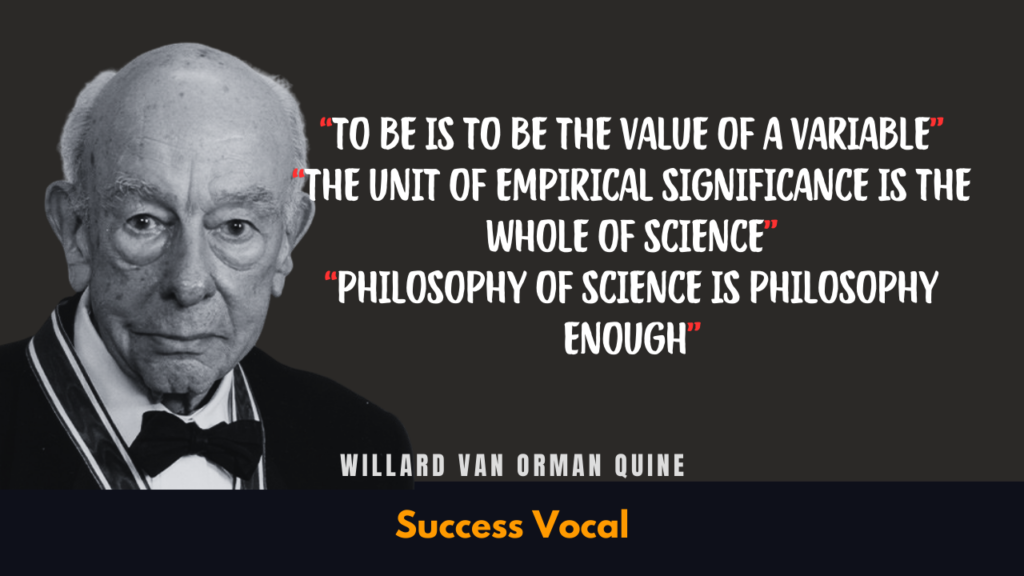
Willard Van Orman Quine, usually known as W.V.O. Quine, is viewed as one of the main thinkers of the twentieth hundred years. A rationalist and thinker via preparing, Quine’s work overcame any barrier among reasoning and experimental science. He is maybe most popular for his dismissal of the logical manufactured differentiation and for advocating naturalism, which accentuates that way of thinking ought to be persistent with logical request.
Table of Contents
Early Life and Background
Birth and Childhood
Willard Van Orman Quine was brought into the world on June 25, 1908, in Akron, Ohio, USA. He experienced childhood in a family that energized scholarly interest, especially in math and science. His initial interest in critical thinking and rationale set up for his future in way of thinking.
Family and Upbringing
Quine’s dad was a maker, while his mom was a teacher. They upheld his scholarly interests and urged him to investigate different subjects since early on. His initial interest with puzzles and sensible reasoning in the end drove him to theory and math.
Early Education
Quine went to nearby schools in Akron, where he succeeded scholastically. He later continued on toward Oberlin School, where he started to investigate theory and math in more noteworthy profundity.
Academic Beginnings
Undergraduate Studies at Oberlin College
At Oberlin School, Quine at first centered around science yet before long fostered an interest in way of thinking, especially in the space of rationale and epistemology. His double love for these subjects would shape his whole vocation.
Interest in Mathematics and Philosophy
Quine’s normal tendency toward critical thinking and his developing interest in the primary parts of information drove him to a mix of math and philosophical request. His undergrad years gave the establishment to his future work in rationale.
Graduation and Early Influences
Quine moved on from Oberlin in 1930, after which he sought after graduate examinations at Harvard College. His scholarly excursion was impacted by savants like Bertrand Russell and Alfred North Whitehead, whose work on numerical rationale significantly affected him.
Graduate Studies at Harvard
Doctorate and Early Research
Quine procured his PhD from Harvard in 1932, finishing his paper on numerical rationale. His work was profoundly impacted by his guide, Alfred North Whitehead, one of the co-creators of the fundamental work Principia Mathematica.
Study Under Alfred North Whitehead
At Harvard, Quine had the chance to concentrate on under the absolute most persuasive thinkers and scholars of his time. Whitehead’s way to deal with rationale and his accentuation on the sensible design of information impacted Quine’s reasoning.
Influence of Logical Positivism
During this time, Quine was likewise impacted by the coherent positivist development, especially the Vienna Circle and Rudolf Carnap. Sensible positivism stressed a logical way to deal with theory, zeroing in on coherent examination and experimental check.
Quine’s First Major Contributions
Early Works in Logic and Philosophy
Quine’s initial scholastic profession was described by his work in rationale, especially his emphasis on proper frameworks and their philosophical ramifications. He distributed a few papers and books, including “An Arrangement of Strategic” in 1934, which laid out him as a huge figure in the field.
The Harvard Years
Quine turned into a teacher at Harvard and burned through the vast majority of his scholarly profession there. His initial years were set apart by serious scholarly movement, where he further fostered his considerations on rationale, reasoning of language, and epistemology.
“A System of Logistic” and Early Writings
In his initial works, Quine handled issues of formal rationale and language, setting up a good foundation for himself as one of the principal scholars in the scientific practice. His emphasis on proper frameworks laid the preparation for his later dismissal of key philosophical differentiations.
World War II and Its Impact
Quine’s Work with the Navy
During The Second Great War, Quine served in the U.S. Naval force as a cryptographer, dealing with codebreaking and interchanges. His involvement with applied rationale during the conflict would impact his later work in way of thinking.
Cryptography and Codebreaking
Quine’s work in cryptography leveled up his scientific abilities and extended how he might interpret the reasonable uses of rationale. This active involvement in critical thinking additionally cemented his perspectives on the crossing point of rationale and observational science.
Post-War Influence on Philosophy
After the conflict, Quine got back to Harvard, where his experience during the conflict had given him a more commonsense viewpoint on philosophical request. He turned out to be progressively reproachful of the philosophical vision that overwhelmed a lot of scientific way of thinking at that point.
Key Philosophical Ideas
The Rejection of the Analytic-Synthetic Distinction
In his pivotal paper “Two Doctrines of Experimentation” (1951), Quine broadly went after the differentiation between scientific insights (those valid by definition) and manufactured insights (those valid by exact perception). This dismissal was a significant change in the way of thinking of language and epistemology.
“Two Dogmas of Empiricism”
Quine’s “Two Authoritative opinions of Observation” contended that no sharp limit exists among insightful and engineered explanations. He accepted that information is an organization of interconnected convictions that are dependent upon correction in light of involvement.
Quine’s View on Empirical Science
For Quine, reasoning was not unmistakable from science; all things considered, it was a piece of the consistent course of investigation into the world. He advocated naturalism, contending that philosophical inquiries ought to be tended to involving similar techniques as logical ones.
Quine’s Holism and Ontological Relativity
The Web of Belief
Quine presented the possibility of a snare of conviction, where every faith in the framework is upheld by others. Changes in a single conviction can influence the whole web, proposing that no conviction is safe to modification.
Holism in Language and Knowledge
Quine’s comprehensive quality contended that language and information are not confined for a fact. All our insight, including rationale and arithmetic, is interconnected and impacted by exact perception.
Quine’s Principle of Indeterminacy of Translation
In his later work, Quine fostered the possibility of the indeterminacy of interpretation, which guarantees that there is no genuine method for making an interpretation of one language into another impeccably. This idea significantly affects the way of thinking of language.
Criticisms and Legacy in Philosophy
Criticism from Other Philosophers
Quine’s extreme dismissal of the scientific manufactured qualification and his naturalism were met with analysis from additional conventional rationalists, especially those in the sensible positivist camp.
Impact on Analytic Philosophy
Regardless of reactions, Quine’s thoughts became vital to the advancement of logical way of thinking during the twentieth 100 years. His dismissal of specific philosophical authoritative opinions opened new roads for request in epistemology and theory of language.
Quine vs. Carnap
Quine had a well established scholarly competition with Rudolf Carnap, a main figure in coherent positivism. While Carnap guarded the qualification among scientific and manufactured insights, Quine’s dismissal of this differentiation was a main issue of conflict.
Later Life and Career
Teaching and Academic Career
Quine went through more than 40 years instructing at Harvard College, where he prepared and impacted ages of thinkers. He was known for his thorough way to deal with rationale and his capacity to motivate profound philosophical request in his understudies.
Retirement and Honors
Quine resigned from Harvard in 1978 however proceeded to compose and address. He got various distinctions all through his vocation, incorporating the Kyoto Prize in 1996, quite possibly of the most lofty honor in way of thinking.
Personal Life and Interests
Beyond theory, Quine had an enthusiasm for movement and dialects. He communicated in a few dialects and was known for his advantage in fascinating societies and spots.
Influence on Modern Philosophy
Quine’s Impact on Philosophy of Language
Quine’s work in the way of thinking of language, especially his hypothesis of indeterminacy of interpretation, lastingly affects etymology and reasoning. His thoughts regarding language keep on affecting contemporary discussions on significance and translation.
Influence on Epistemology and Logic
Quine’s naturalized epistemology moved the manner in which logicians approach the investigation of information. His work in rationale and the way of thinking of science likewise helped overcome any issues between exact exploration and philosophical request.
Contributions to Philosophy of Science
Quine’s dismissal of a severe division among reasoning and science significantly affects the way of thinking of science. His work laid the preparation for a more incorporated way to deal with figuring out the idea of the real world.
Conclusion
Willard Van Orman Quine was a transcending figure in twentieth century reasoning, known for his progressive thoughts in rationale, epistemology, and the way of thinking of language. His dismissal of well established philosophical differentiations, like the logical engineered partition, made the way for better approaches for pondering information and reality. Quine’s impact keeps on significantly shaping philosophical idea today, making him quite possibly of the main figure in current logical way of thinking.
FAQs
What was Quine’s most influential work?
Quine’s most compelling work is his paper “Two Creeds of Observation” (1951), where he broadly dismissed the scientific manufactured differentiation.
How did Quine’s ideas challenge traditional philosophy?
Quine tested the possibility that specific philosophical ideas, like the scientific manufactured differentiation, could be treated as primary insights. He contended that all information is interconnected and dependent upon amendment in view of exact proof.
What is Quine’s view on the analytic-synthetic distinction?
Quine dismissed the scientific engineered differentiation, contending that there is no reasonable limit between bits of insight in view of importance (logical) and bits of insight in light of realities (manufactured).
What did Quine contribute to the philosophy of language?
Quine presented the possibility of indeterminacy of interpretation, which recommends that there is no genuine approach to impeccably make an interpretation of one language into another.
What is Quine’s legacy in modern philosophy?
Quine’s heritage lies in his dismissal of philosophical creeds and his accentuation on the progression among reasoning and observational science. His thoughts keep on affecting discussions in epistemology, reasoning of language, and the way of thinking of science.


